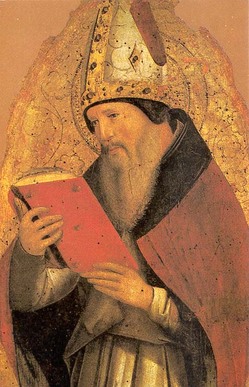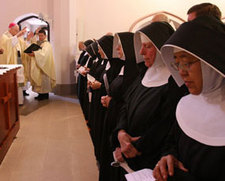Ecumenism: September 2009 Archives
The following is the text Benedict XVI sent to Cardinal Walter Kasper, president of the Pontifical Council for Promoting Christian Unity, on the occasion of the 11th Inter-Christian Symposium, which began today in Rome.
Through you, venerable brother, in your capacity as president of the Pontifical Council for Promoting Christian Unity, I have the pleasure and joy of sending a warm and auspicious greeting to the organizers and participants of the 11th Inter-Christian Symposium, promoted by the Franciscan Institute of Spirituality of the Pontifical University Antonianum and by the Aristotle Orthodox Theological Faculty of Thessalonica, planned in Rome from Sept. 3-5.
I am happy first of all for this initiative of fraternal encounter and exchange on the common aspects of spirituality, which is beneficial for a closer relationship between Catholics and Orthodox. In fact, these Symposiums, which began in 1992, address important and constructive topics for reciprocal understanding and unity of intention. The fact that it takes place alternatively in a territory of Catholic or Orthodox majority also allows for real contact with the concrete, historical, cultural and religious life of our Churches.
In particular, this year you wished to organize the Symposium in Rome, city that offers all Christians indelible testimonies of history, archaeology, iconography, hagiography and spirituality, strong stimulus to advance toward full communion and above all, the memory of the Apostles Peter and Paul, Protothroni, and of so many martyrs, ancient witnesses of the faith. Of them, St. Clement of Rome wrote that "suffering ... many insults and torments, they became a most beautiful example for us" (Cf. Letter to the Corinthians, VI,1).

The topic chosen for the next meeting: "St. Augustine in the Western and Eastern Tradition" -- argument intended to be developed in collaboration with the Patristic Institute Augustinanum -- is most interesting to reflect further on Christian theology and spirituality in the West and in the East, and its development. The Saint of Hippo, a great Father of the Latin Church, is, in fact, of fundamental importance for theology and for the West's very culture, whereas the reception of his thought in Orthodox theology has revealed itself to be rather problematic.
Hence, to know with historical objectivity and fraternal cordiality the doctrinal and spiritual riches that make up the patrimony of the Christian East and West, is indispensable not only to appreciate them, but also to promote better reciprocal appreciation among all Christians.
Therefore, I express cordial wishes that your Symposium is fruitful in that it discovers doctrinal and spiritual convergences that are useful to build together the City of God, where his children can live in peace and in fraternal charity, based on the truth of the common faith. I assure you of my prayer for this end, asking the Lord to bless the organizers and the institutions they represent, the Catholic and Orthodox speakers and all the participants. May the Grace and peace of the Lord be in your collaborators and in your minds!
In Castel Gandolfo,
August 28, 2009
Benedictus PP. XVI
 You may have seen the story of 10 nuns come into full communion with the Catholic Church. The ceremonial aspect of full communion was yesterday but the journey to that point was long in coming individually and corporately. Archbishop Edwin O'Brien of Baltimore received the nuns and is working with them to become a diocesan right community.
You may have seen the story of 10 nuns come into full communion with the Catholic Church. The ceremonial aspect of full communion was yesterday but the journey to that point was long in coming individually and corporately. Archbishop Edwin O'Brien of Baltimore received the nuns and is working with them to become a diocesan right community.

